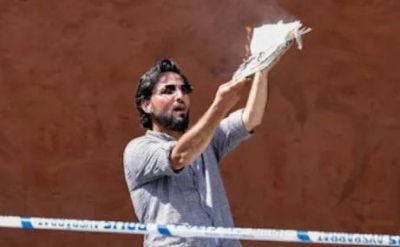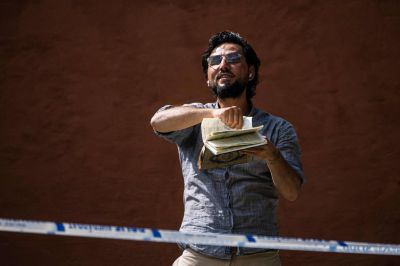Salwan Momika protests outside a mosque in Stockholm on June 28, 2023, during the Eid al-Adha holiday. (Credit: Jonathan Nackstrand/AFP)
On June 29, Salwan Momika, a 37-year-old Iraqi, tore up and lit pages of the Islamic holy book on fire in Stockholm during a protest authorized by police, as Muslims celebrated the Eid al-Adha holiday.
The incident, which took place outside the Stockholm Central Mosque, prompted condemnation and protests across the Muslim world, including criticism from Lebanese religious figures and parties. Meanwhile, Muqtada al-Sadr, a populist Iraqi cleric, urged the Swedish government to strip Momika of his citizenship and repatriate him so he could be tried in accordance with Iraqi law.
After the burning, Swedish police charged Momika with agitation against an ethnic or national group, Reuters reported.
L'Orient Today asked three Lebanese intellectuals their thoughts on the incident.
Elie Al Hindy is the executive director of Adyan Foundation, whose mission is to manage diversity, promote solidarity and safeguard human dignity. He contends that freedom of expression laws are often a double-edged sword.
In terms of the censorship of freedom of expression, these censorships are always a double-edged sword. When laws against such acts are used, they usually come in a broad format that has more negative than positive outcomes, and they are used as tools to oppress freedom of expression. In general, we are against such censorship, even if the freedom of expression is offensive to others. We cannot protect people from feeling offended; instead, we should work on creating right-based societies. As Adyan says, if we want to defend freedom of expression in that sense, it is really important to work on social cohesion, social acceptance, inter-religious dialogue, understanding each other, etc. It is this process that would lead to a lack of offenses or very aggressive acts, like burning the Quran. We limit those through better understanding and communication, not through the law, because the law is always going to be a double-edged sword. That being said, of course, the incident, although legal under the context of human rights and freedom of expression in Sweden, … would create a lot of problems, so it could have been simply avoided. However, avoidance happens by choice out of respect for others, not because the law tells me so.
As part of human rights, which should be the basis of any democratic society — according to the human experience, [it] is the best way to manage a society — we have the concept that your freedom ends when you infringe on the freedom of others. However, we need to understand that criticizing others and even offending them is not limiting their freedom, it is taking my freedom to the extreme, which is offensive, and their reaction might be negative. However, it is part of my freedom and does not stop them from practicing their freedom of expression or belief. So even if I offend Jesus Christ or the Prophet Mohammad, it doesn’t mean that I am banning the believers of that faith from practicing their faith. I'm just expressing my opinion in an offensive way. In that sense, it is necessary to keep this freedom as the basis as long as you aren't physically aggressive toward the other person or ban them from practicing their freedom. This is the only way to keep societies healthy and to keep human rights and freedom as the essence of a healthy and democratic society.
Sheikh Mohammad Nokkari is the former managing director of Dar al-Fatwa and a renowned Islamic judge in Beirut. He believes Muslims are discriminated against in many European jurisdictions.
The main problem is that Europe has lost the law of equality when it comes to cases related to Arabs and Muslims. You find laws that protect everyone, and their freedom of expression is guaranteed — when they attack Jewish people, they get legally punished. When they attack homosexuality, they get legally punished, but when it comes to Islam, they have the right to. Their standards are reversed, and this is hatred against Arabs and Muslims. If they burn a flag for homosexuals, what would have happened? Things would have escalated. If it was a case related to Jewish people, they would have been prosecuted. We see degrees of professors who criticize Jewish people being taken away. Freedom of expression stops when it comes to anything related to non-Muslims, but when it comes to us, they have the right to criticize and attack it. The path is clear for them to mock it.
Jad Shahrour is a spokesperson for the Samir Kassir Foundation, which advocates freedom of the press. He emphasizes the role the law plays in determining what counts as freedom of expression.
Let's start from a principle, which is that freedom of expression should never be a justification to eliminate others. However, the principle of punishment against any published content or any stance differs from one country to another. The first standard is the law: does the law allow the criticism of religions? If yes, then it's freedom of expression. Another factor that plays a role is the culture and mentality of the people of the country, which is what sets the way to deal with this act. That's why reactions to such incidents differ in different countries. Today, this incident is annoying to Muslims and might trigger protests, including among the Muslim community in Sweden, who might protest in a peaceful way.

